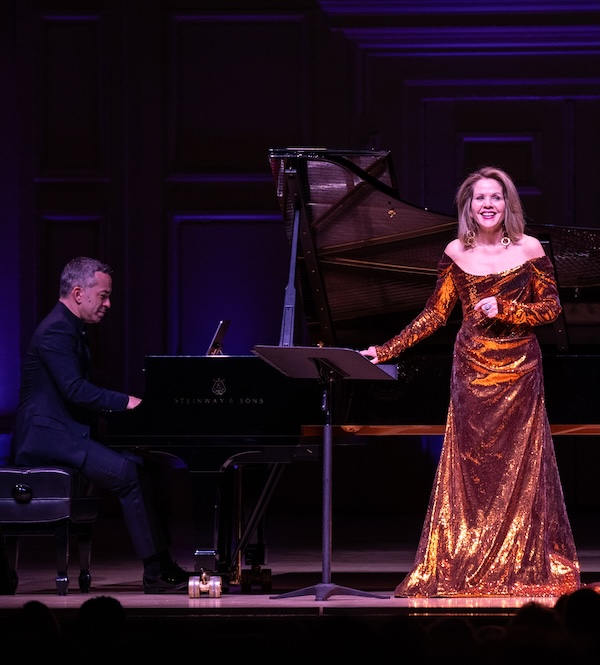Fleming’s artistry emerges intact against nature visuals

Renée Fleming performed a recital with pianist Inon Barnatan Sunday at Symphony Hall for the Celebrity Series. Photo: Robert Torres
“I’m so glad we sang together” isn’t a phrase usually addressed to the audience at the end of a vocal recital.
Then again, most recitalists aren’t Renée Fleming, whose gifts as a singer are only matched by her abilities as an emcee, curator of thoughtful programs, and, on Sunday, supporter of audience participation.
So it happened that the afternoon’s capacity crowd in Symphony Hall was invited by the soprano to join her in the refrain of Leonard Cohen’s “Hallelujah.” From the sound of things, most of the 2,000-plus in attendance took up Fleming’s offer.
That Cohen’s majestic ballad—the recital’s only encore—didn’t stand out in the wrong way says much about Fleming’s larger program, which didn’t so much tear down barriers between genres, periods, and styles as simply ignore them.
Built around her Grammy Award-winning album, Voice of Nature: The Anthropocene, Sunday’s concert, which marked Fleming’s first Celebrity Series appearance since 2015, offered a mix of songs, arias, and keyboard pieces. Over the first half, too, there was a video projection of various natural scenes, courtesy of National Geographic.
The latter proved stunning, if a bit overwhelming. Indeed, the roughly 30-minute-long film commanded the attention; Fleming’s singing was subordinate to it. Even more so were pianist Inon Barnatan’s precise yet discreet contributions.
Perhaps, though, that was part of the point: even humankind’s great artists are dwarfed by the immensity of Nature. How much more so the rest of us?
Conceptually, the effort, which Fleming dubbed her “pandemic project,” emerged from the singer’s concern over the burgeoning climate crisis; her note on the program cites Romantic-era composers and poets whose work embraced the natural world.
Ironically, no Schubert, Schumann, or Mahler were to be found on Sunday. In fact, the nearest the afternoon’s first half came to the standard canon was “Cara selve” from George Frederic Handel’s Atalanta: its references to “beloved forests, joyous shadows” accompanied projections of towering redwoods.
Otherwise, most of the selections hailed from the recent past. Nico Muhly’s “Endless Space,” Maria Schneider’s “Our Finch Feeder,” and Kevin Puts’ “Evening” explored various shades of intensity. Joseph Canteloube’s “Baïléro” evoked a rustic scene.
Björk’s “All is Full of Love” formed the first half’s simplistic centerpiece. For an altogether profounder and more memorable exploration of its theme, one had to wait for Burt Bacharach’s “What the World Needs Now” just before intermission.
The afternoon’s wide-ranging musical lineup sometimes aligned clearly with the visual component: Fleming’s account of Howard Shore’s “Twilight and Shadow,” for instance, was paired with stunning nightscapes and auroras. “Our Finch Feeder” accompanied an array of avian images, alone and in flocks.
Other relationships were more elliptical. Barnatan performed the “Presto” from Sergei Rachmaninoff’s Moments Musicaux with tempestuous shape, though how that particular work corresponded to footage of rivers and forests wasn’t entirely obvious.
Regardless, soprano and pianist moved seamlessly between classical, jazz, and pop idioms. Though Fleming sang Hazel Dickens’ “Pretty bird” with a microphone (which she also took up for the Björk and Shore numbers), the usage had no obvious impact on her delivery.
In fact, as she approaches the age when many singers start thinking about retirement, Fleming’s instrument seems to be in impeccable shape. Though some high notes fell a shade flat and she took a few minutes to settle into Symphony Hall’s cavernous acoustic, the singer’s tone was even and projection consistent across her full range.
That showed especially in the afternoon’s second half, which continued in the vein of the first, though minus the visuals. Songs by Gabriel Fauré and Edvard Grieg trafficked in familiar Romantic nature-love imagery. Barnatan delivered a breathtakingly glassy, transparent account of Maurice Ravel’s fiendish “Jeu d’eau.”
Afterwards came the recital’s closing set: Giacomo Puccini’s “O mio babbino caro,” Jerome Kern’s “All the Things You Are,” and Andrew Lippa’s “The Diva.” While the latter’s lyrical theatrics were played, knowingly, to the hilt, the Puccini and Kern items offered real artistry, two ways.
The former’s last bars floated with feather-light ease. Meanwhile, the little scat figure Fleming nailed at the end of the Kern sounded like an impromptu add-on. Whether or not it was, the gesture ensured that the performance was unforgettable.
The Celebrity Series presents Víkingur Ólafsson playing J. S. Bach’s Goldberg Variations8 p.m. Saturday at Jordan Hall. celebrityseries.org
Posted in Performances